#as the wine accompanying the bread in the eucharist
Text
i will be the first to admit that this might be reaching a bit. also discussions of religious concepts in lgts ahead
so catholicism in lgts is explored through the struggles of living in a small catholic town like kieferberg, and literally everything about walpurga, the forest deity turned saint. but imo there's also something to be said about how elise obtains the tender flesh: this might be a reflection of the sacrament of the eucharist as understood during the medieval era.
but what is the eucharist anyway?
in catholic doctrine the eucharist is supposed to be the body of christ manifested through transubstantiation: the transformation of bread and wine into his flesh and blood respectively. this is based on the events of the last supper in the bible, wherein before his death jesus offers his body to his disciples through the bread and wine that they share. thing is, current understanding of transubstantiation is moreso in a metaphysical sense: catholics who do believe in it don’t actually think that they’re eating jesus’ physical body.
that wasn't always the case with medieval catholicism, however. there were theorists like st aquinas and berengar who argued for a metaphysical transubstantiation, but powerful church officials like cardinal humbert (who actually forced berengar to recount his claims) also believed that the faithful partaking in the eucharist were actually eating the literal, physical flesh and blood of jesus. there was quite a bit of concern too because of this: the body of christ, torn apart and chewed on by not just the faithful, but potential sinners?
the average catholic of that time probably didn't care much for the specifics of how transubstantiation worked (either way, the bread is/represents jesus, whether or not that was physical or not), but the point is there was an ongoing debate—if only among high-ranking church officials and theologians—about what the eucharist really was. now keep in mind that aforementioned literal physicality of the eucharist, and how similarly that plays out to the relevant witching hour segments in lgts.
i want to first highlight the scene where the crows in murim's domain rip out parts of elise's hair for the wheat testament:
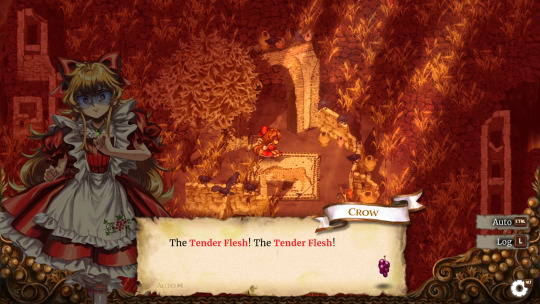


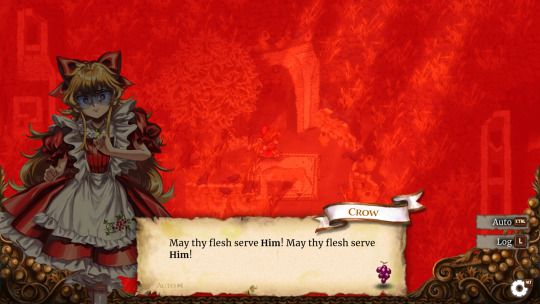
and the aftermath:

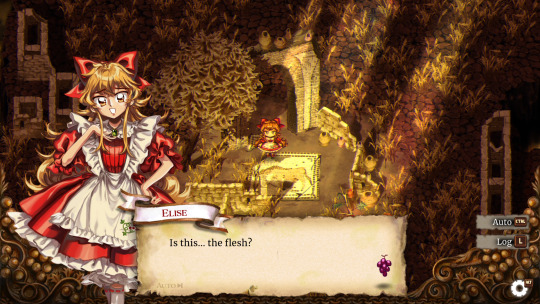
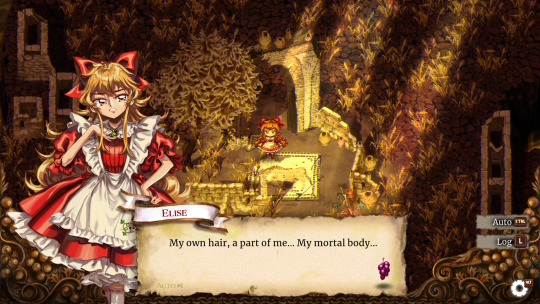
they sure are hungry, huh? and the way they get at elise is pretty violent, judging by her screams and the sounds of tearing flesh. their carnal hunger, expressed through their lines and the violence in how they form the wheat testament from her hair, brings to mind similar fears of an animalistic, near sacrilegious ingestion of a certain sacred body turned bread, only this time realized in a demonic trial. in other words, the entire trial subverts christ's supposed physical presence in the bread. besides, it's stated outright that elise is meant to physically combine a piece of her body—her hair—into that wheat.
she does just that in the windmill:
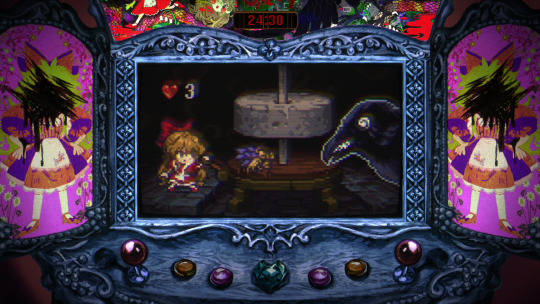

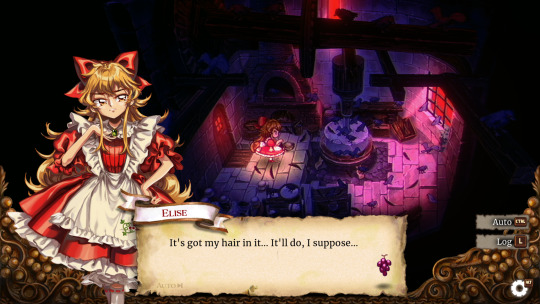
her hair baked into the (apparently unleavened) bread is the tender flesh that the crows hungered for, that would eventually find its way onto ozzy's table.
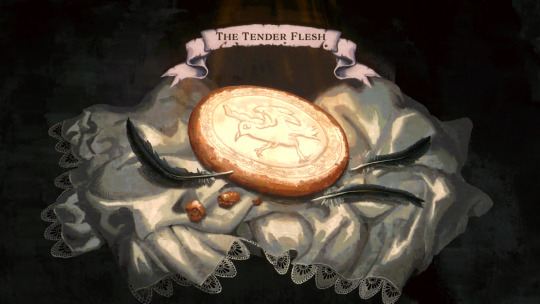
so the process of acquiring the tender flesh seems to imitate that transubstantiation in the celebration of the eucharist. if that's the case, i wonder why ozzy and his minions would design them this way…
btw here's my sources for medieval transubstantiation (despite my unhinged rambling i did do a bit of research):
https://www.jstor.org/stable/23964057 (Ego Berengarius by Chadwick, H., 1989)
https://global.oup.com/academic/product/some-later-medieval-theories-of-the-eucharist-9780199658169 (Some Later Medieval Theories of the Eucharist by Adams, M. M., 2010)
#little goody two shoes#lgts#elise lgts#father hans' study#considering that the game takes place from the pov of someone who's not a fan of the church#which considering that it's kieferberg is understandable#it's interesting how readily she throws herself into what's basically a subversion of one of catholicism's most central sacraments#and to her credit she does technically get what she wants#even if it is a monkey's paw#it gives me Feelings#haven't analyzed the sweetest nectar in connection to this yet#but there are some parallels i feel#or similar functions#as the wine accompanying the bread in the eucharist#so the sweetest nectar—which does look like red wine and is made from a mixture of blood and water—accompanies the tender flesh#definitely did not plan on posting this during holy week no not at allllll
25 notes
·
View notes
Text
THIS DAY IN GAY HISTORY
based on: The White Crane Institute's 'Gay Wisdom', Gay Birthdays, Gay For Today, Famous GLBT, glbt-Gay Encylopedia, Today in Gay History, Wikipedia, and more …

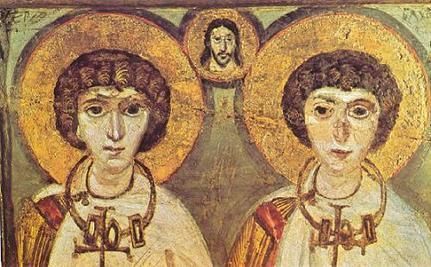
c.303 – Today is the Feast Day of Saints Sergius and Bacchus, third century Roman soldiers who are commemorated as martyrs by the Catholic, Eastern Orthodox and Oriental Orthodox churches.
Republicans and other opponents of gay marriage often speak of marriage as being a 2,000 year old tradition (or even older). Quite apart from the fact that the definition of marriage has changed from when it was a business transaction, usually between men, there is ample evidence that within just Christian tradition, it has changed from the point where same-sex relationships were not just tolerated but celebrated.
In the famous St. Catherine's monastery on Mount Sinai, there is an icon which shows two robed Christian saints getting married. Their 'pronubus' (official witness, or "best man") is none other than Jesus Christ. The happy couple are 4th Century Christian martyrs, Saint Serge and Saint Bacchus — both men.
According to tradition, they were Roman citizens and high-ranking officers of the Roman Army, but their covert Christianity was discovered when they attempted to avoid accompanying a Roman official into a pagan temple with the rest of his bodyguard. After they persisted in refusing to sacrifice to Jupiter in the company of the emperor Galerius, they were publicly humiliated by being chained and dressed in female attire and paraded around town.
Galerius then sent them to Barbalissos in Mesopotamia to be tried by Antiochus, the military commander there and an old friend of Sergius. Antiochus could not convince them to give up their faith, however, and Bacchus was beaten to death. The next day Bacchus' spirit appeared to Sergius and encouraged him to remain strong so they could be together forever. Over the next days, Sergius was also brutally tortured and finally executed at Resafa, where his death was marked by miraculous happenings.
Severus of Antioch in the sixth century explained that "we should not separate in speech [Serge and Bacchus] who were joined in life." More bluntly, in the definitive 10th century Greek account of their lives, Saint Serge is described as the "sweet companion and lover (erastai)" of St. Bacchus.
Yale historian John Richard Boswell discovered this early Christian history and wrote about it nearly 20 years ago in "Same Sex Unions In Pre-Modern Europe" (1994).
In ancient church liturgical documents, he found the existence of an "Office of Same Sex Union" (10th and 11th century Greek) and the "Order for Uniting Two Men" (11th and 12th century Slavonic).
A 14th century Serbian Slavonic "Office of the Same Sex Union," uniting two men or two women, had the couple having their right hands laid on the Gospel while having a cross placed in their left hands. Having kissed the Gospel, the couple were then required to kiss each other, after which the priest, having raised up the Eucharist, would give them both communion. Boswell documented such sanctified unions up until the 18th century.
In late medieval France, a contract of "enbrotherment" (affrèrement) existed for men who pledged to live together sharing 'un pain, un vin, et une bourse' - one bread, one wine, and one purse.
Other religions, such as Hinduism and some native American religions, have respect for same-sex couples woven into their history.
When right-wing evangelical Christians talk about "traditional marriage," there is no such thing.

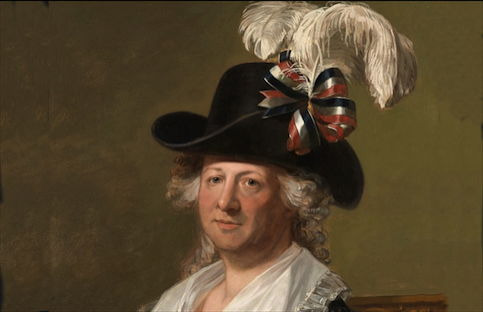
1728 – On this date Chevalier d'Éon, (full name Charles Gemeviéve Louis Auguste André Timothee d'Éon de Beaumont) was born (d.1810). A French diplomat, spy, soldier and Freemason who lived the first half of her life as a man and the second half as a woman. If you look up eonism in your dictionary, you may or may not find it. It's a pseudo-scientific word for transvestism that has the quaint ring of Stekel or other Herr-Doktors who were writing in turn-of-the-century Vienna when people seem to have been having love affairs with their piccolos or putting clown hats on their penises.
The Chevalier d'Éon, a century before, loved to dress in drag. Supposedly, the French adventurer originally had been sent on various spying missions disguised as a woman and so liked the feel of silk and satin that he decided to stay dressed in costume the rest of his life. Not that he had much choice. When word got out that he really liked taking four hours to dress each morning, King Louis XV decreed that the chevalier had to wear women's clothes forever after. For years people laid bets on d'Éon's sex, but a post mortem examination of his body conclusively established the fact that he was very much a man.

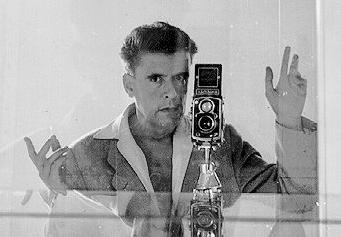
Herbert List Self-portrait
1903 – Herbert List (d.1975) was a German photographer, who worked for magazines, including Vogue, Harper's Bazaar, and Life, and was associated with Magnum Photos. His austere, classically-posed black-and-white compositions, particularly of male nudes, taken in Italy and Greece have been highly formative for modern photography, with contemporary fashion photographers like Herb Ritts being clearly influenced by List's style. He is also noted for his erotic street photography.
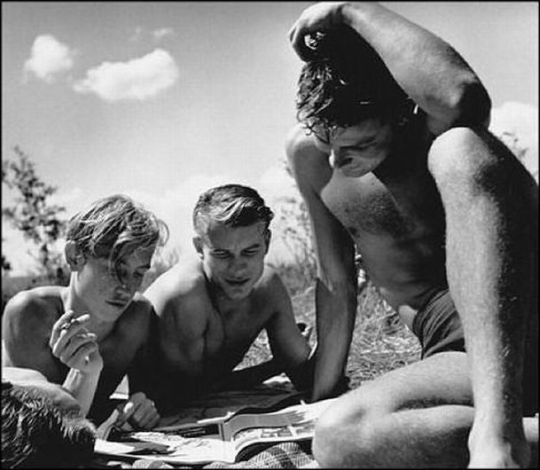
Born and raised in Hamburg, Germany, part Jewish and all gay, Herbert List fled his family's Hamburg coffee brokerage business in 1936 and traveled through free Europe taking many of his best known photographs. He was in Greece shooting pictures when Germany invaded the country in 1941. List was forced to return home and later was conscripted into the German army, even though he was part Jewish and homosexual..
He spent 1944-45 in Norway making military maps. After the war he joined Magnum but for whatever reason he didn't take many photos. He published three major books of earlier work and eventually gave up photography altogether to concentrate on his drawings, which are currently on view at the gay museum in Berlin.
In 1988, Stephen Spender finally published his novel The Temple, a roman a clef of his pre-War years in Germany, which includes a List-inspired character named Joachim. List died in 1975 but his style lives on in the work of Herb Ritts and Bruce Weber, among others.

1987 – A US Justice Department report declared the most frequent victims of hate crimes are gays, lesbians, and bisexuals

1993 – A protest, complete with a book burning, was held to object to a donation of two gay-themed books, Annie on My Mind and All-American Boys to 42 Kansas City, Missouri high schools.

TODAY'S GAY WISDOM :
Nobel Peace Prize Winner, Archbishop Desmond Tutu
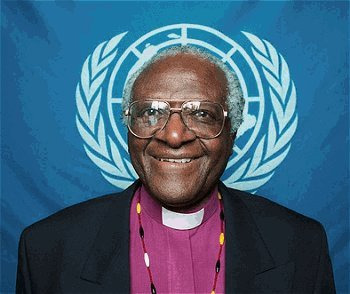
"We struggled against apartheid in South Africa, supported by people the world over, because black people were being blamed and made to suffer for something we could do nothing about; our very skins. It is the same with sexual orientation. It is a given. And I am proud that in South Africa, when we won the chance to build our own new constitution, the human rights of all have been explicitly enshrined in our laws. Yet, all over the world, Lesbian, Gay, bisexual and transgender people are persecuted. We treat them as pariahs and push them outside our communities. We make them doubt that they too are children of God - and this must be nearly the ultimate blasphemy. We blame them for what they are. Churches say that the expression of love in a heterosexual monogamous relationship includes the physical, the touching, embracing, kissing, the genital act - the totality of our love makes each of us grow to become increasingly godlike and compassionate. If this is so for the heterosexual, what earthly reason have we to say that it is not the case with the homosexual?"


4 notes
·
View notes
Text
Catholic Services
The Mass has four basic parts or rites. The first is the 'Introductory Rite'. The priest processes in, accompanied by altar servers (usually boys and girls who help the priest by carrying things, giving him things). Often there is a song at this time.
Then there are Scripture readings and a sermon. Finally, the Nicene Creed or Apostles' Creed is recited by all.
Liturgy of the Word
In the Liturgy of the Word we hear Scripture readings Catholic Services, and a homily that explains them to us. We also pray the General Intercessions.
The Church teaches that the signs and symbols used in liturgy are not just empty words, but they communicate real spiritual realities. In the Liturgy of the Word Christian participants express and perceive these realities through physical signs and symbols: creation, human culture, events in the Old Testament, and Christ's revelation.
Before the Gospel reading, people make the sign of the cross on their foreheads, lips and hearts. During the homily there is usually a period of silence for recollection. Then the congregation stands to recite the Apostles' Creed or Profession of Faith. At this point baskets are passed for monetary offerings.
Liturgy of the Eucharist
The Eucharist is the second of the two principal rites of the Mass. It consists of the presentation of the bread and wine at the altar, their consecration by the priest during the Eucharistic Prayer, and the distribution of the consecrated elements in Holy Communion.
After the priest offers the Eucharistic Prayer (called the epiclesis) and gives thanks, the people receive the Body of Christ either on the tongue or in their hands. As they receive, the people bow in reverence. The Eucharist unites the Church in communion with the Father, Jesus, and all the saints.
The Catholic Church practices open communion in the Eucharist, so that baptized Christians can receive the Body and Blood of Christ without restriction. This includes members of Eastern churches that are not in full communion with the Catholic Church and non-Catholics who share their faith in Jesus Christ.
Liturgy of the Sacraments
The Church celebrates these sacraments to make present the riches of Christ's power and merits for her members and to fill them with his grace so they can serve others and continue his mission. These sacraments are not mere symbols, but they are the very source and instruments of salvation.
The signs of the liturgy (veneration of the book, prominent place for the lectern, intelligible reading, the homily which prolongs the proclamation, and the assembly's response) nourish faith. The sacraments of Holy Orders and Matrimony confer a special grace for specific functions in the service of ecclesial communion.
All the baptized, however, share in Christ's priesthood and are therefore called to participate actively in the liturgy. They should "strive for that full, conscious and active participation which is their right and duty" (Second Vatican Council). The Liturgy of the Hours unites the baptized to Christ the High Priest in an unceasing prayer of praise, thanksgiving and petition.
Prayers of the Faithful
Prayers of the Faithful are a group of intercessory prayers that are part of liturgy at Catholic, Anglican, Methodist, and Lutheran (and other western liturgical churches) services. Also known as the General Intentions, they ask for intercessions for the Church, global issues, and individuals in a community.
These prayers are a reminder that the gathered Church is united with the universal
Church in prayer. While they can include very particular requests, it is not appropriate to pray for the health of everyone’s uncle or a full list of people in the parish with diabetes.
After the Prayers of the Faithful there is typically a brief silence for recollection, and then the Profession of Faith or Creed is said. Then the Priest concludes with a Concluding Prayer.
Prayers of the People
The Prayers of the People are a time of public prayer in worship Orthodox services, a response to the proclamation of Word. The prayers move in a well defined sequence and cover specific content. They typically begin with a global view of the world and church, then move to local concerns of congregation and community, then finally to individual and personal needs.
The Prayers of the People are often accompanied by music and songs that praise God and encourage believers to live in ways that please Him. These songs are often sung by the entire congregation, resulting in a powerful, moving experience of praise and worship.
0 notes
Text
Scorsese’s gods of the streets: From ‘Killers of the Flower Moon’ to ‘Silence,’ faith is rarely far off in his films

DAYTON, Ohio
A widely circulated still from the set of Martin Scorsese’s latest film, “Killers of the Flower Moon,” shows the director sitting in a church pew. Next to him is Lily Gladstone, who plays the role of Mollie Kyle, an Osage woman whose family is targeted as part of a broader conspiracy by white Americans to steal the tribe’s wealth, to the point of marrying and killing its members.
In the photograph, Scorsese appears to hold rosary beads, a common devotional object for many Catholics. Mollie is Catholic, so the rosary makes sense as a prop. But as a scholar of religion and film, I’m struck by how it calls to mind the director’s own complex Catholicism and its imprint on his decades of filmmaking.

Scorsese stands in a long line of Catholic American filmmakers, stretching back to the 1930s and 1940s – one that includes Irish Americans John Ford and Leo McCarey, and Italian immigrant Frank Capra. At a time when Catholicism still seemed foreign to many Americans, those directors helped normalize the faith, making it seem like part of a shared American story.
Yet in his films, Scorsese has taken a much more personal approach to exploring Catholic faith and experience. He doesn’t feel the need to defend the religion or burnish its image. His movies are steeped in Catholic sensibilities, but embrace painful questions that often accompany belief: what it means to hold on to religious commitment in a world where God can seem absent.

From altar boy to auteur
Scorsese has often spoken of his Catholic background. Born in New York City’s Little Italy, he went to Catholic schools and served as an altar boy at St. Patrick’s Old Cathedral, which appeared in his early masterpiece “Mean Streets.” Scorsese even began seminary training, but he quickly realized the priesthood was not for him.
Yet the church proved influential. Scorsese has described St. Patrick’s as a spiritual alternative to the violence in the streets around his neighborhood. A priest introduced the young Scorsese to classical music and books that widened his cultural horizons.

A similar tension runs through many of his films: Catholic devotion, mystery and ritual interwoven with ruthless crime. Indeed, the struggle with faith amid brutality is a theme Scorsese returns to over and over, asking what religion might have to offer the world as it actually exists, with all its cruelties, greed and despair.

Presence and absence
That struggle can be described as one between “presence” and “absence,” to use the terms of religious studies scholar Robert A. Orsi.
Religious presence refers to all the ways people experience their gods’ existence in the world and in their lives. For Catholics, for example, the Eucharist is not just a symbol of Christ; the consecrated bread and wine in Communion actually become Jesus’ flesh and blood, according to Catholic teaching.

Orsi describes religious absence, on the other hand, as the experience of doubt and spiritual struggle about a god not felt directly on Earth.
Both presence and absence shape Scorsese’s rendering of religion. God’s absence takes the form of violence and greed in his films. But some characters also carry their gods with them in the world. This is most dramatically seen in “Silence,” released in 2016, which was based on the novel by Japanese Catholic writer Shusaku Endo.

“Silence” is the story of two Jesuit missionaries who travel to 17th century Japan in search of their mentor, another Jesuit who is believed to have renounced the faith during a wave of violent persecutions. One of them, Father Rodrigues, profoundly questions his own faith after witnessing the torture of Japanese Christians.
Why, he wonders, does God allow such suffering? Eventually he himself will renounce his faith in order to save the lives of those to whom he ministers.

The silence of God is the film’s major preoccupation, yet it is filled with devotional imagery. At the climax of the film, Rodrigues tramples on an image of Christ in order to end the torture of other Christians. But just at that moment, he experiences the presence of his God.
The very final scene depicts his burial, years after the film’s main events – a small crucifix clasped in his hand.

Penance ‘in the streets’
This preoccupation with Catholicism stretches back to Scorsese’s 1973 breakthrough film, “Mean Streets.” Harvey Keitel plays a young Italian American man, Charlie, who grapples with his faith in the unforgiving world of New York’s Lower East Side.
Presence, as Orsi points out, is often as much a burden as a solace. Indeed, part of the emotional power in “Mean Streets” lies in Charlie’s own impatience toward Catholic practices and rules. He wants the freedom to be Catholic in his own way.

“You don’t make up for your sins in the church,” he insists in the opening voice-over. “You do it in the streets. You do it at home. The rest is bullshit, and you know it.”
Over the years, Scorsese’s own ambitions have led him far beyond the streets of Little Italy. A number of his films have little to do with religion. Yet movies such as “Casino,” “The Aviator” and “The Wolf of Wall Street” elaborate the same basic question as “Mean Streets”: What is important in a world that so often feels dominated by absence, money and violence? Through a long career, Scorsese has framed both the sacred and profane as compelling but competing forces of human desire.

Shortly before the release of “Silence,” Scorsese visited St. Patrick’s during an interview with The New York Times. “I never left,” he said. “In my mind, I am here every day.”
One might take him at his word. Even in his most recent movie, “Killers of the Flower Moon,” a Catholic sensibility sneaks through in numerous ways. Characters attend Mass at parish churches and bury their dead on consecrated Catholic ground.

Further, the film’s attention to Osage religious practices demonstrates Scorsese’s sensitivity to the power of ritual and devotion. The movie opens with the burial of a ceremonial pipe, highlighting how objects can assume sacred significance. As Mollie’s mother dies, she has a vision of the elders.
But the questions that haunt Scorsese hang over moments that hardly feel religious, too.

Toward the end of the film, when Mollie asks her duplicitous husband, Ernest, to come clean, his refusal to fully confess the harm he did to her and her family epitomizes the depths of his ethical emptiness. Her silence as she gets up and leaves, with an FBI agent standing quietly in the corner, offers a more powerful moral indictment than any legal sentence. The refusal to pay for one’s sins at home and in the streets has rarely looked so damning.
0 notes
Text
Christianity and Wine: The Divine Liquor's Long and Winding Road Through History
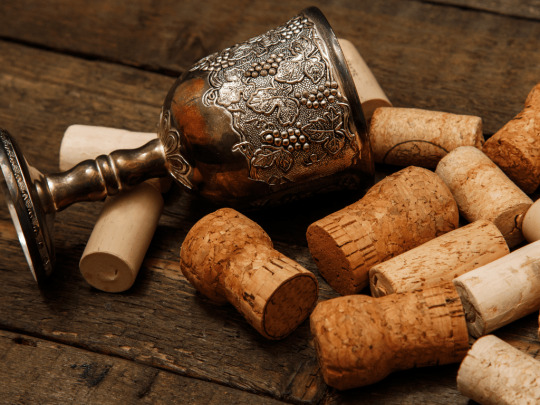
Introduction
Wine has been utilized in religious and cultural ceremonies around the globe for centuries, and in doing so has acquired significant symbolic meaning. Wine has several purposes in Christian rituals, including providing physical nourishment and representing Christ's blood. We will also delve into the deep connection between wine and Christianity as we take you on an amazing tour through the history of wine.
The Bible's Role in the Development of the Wine Business
The Bible must be read in order to understand the background of the Christian love of wine. Wine is shown as a gift from God and an integral part of both secular and religious festivities in the Bible. Many of the events in the Bible took place in the ancient Near East, where wine was a symbol of celebration and prosperity.
Vineyards and wine are held in great esteem in the Old Testament because they are considered signs of God's blessing. Stories from the Bible, such as Noah and the vineyard, Melchizedek's provision of food and wine to Abraham, and Jesus' use of the vine and branches to symbolize spiritual connection, all serve to emphasize the centrality of wine in those eras.
The Lord's Supper, or Holy Communion
The event of the Last Supper was a turning point in the development of both Christianity and wine. Communion, also known as the Holy Eucharist, is an important Christian rite that serves as a commemoration to this event. At the Last Supper with his disciples, Jesus instituted the bread and the wine as symbols of his body and blood.
In Christian liturgy, the breaking of bread and the drinking of wine symbolize both the fellowship of Christians and the memorial of Christ's sacrifice. Consuming wine at the Eucharist is a potent symbol of the genuine presence of Christ and of the eternal oneness of the heavenly and earthly realms.
Christians rely heavily on wine for their rituals and celebrations.
For a very long time, wine has been an integral part of Christian ceremonies and celebrations. The Christian's communion with Christ in his or her crucifixion is represented through wine. The use of wine in religious ceremonies such as Communion and the Mass is a symbol of this bond. Christians can strengthen their spiritual bonds via events like these, which are usually accompanied by prayers and blessings.
Sacramental rites like communion, baptism, and confirmation all feature the use of wine. Wine is a staple at most Christian celebrations since it stands for merriment, fellowship, and God's grace. Wine is commonly utilized in religious rites because of its propensity to promote both joyous recollection and somber concentration.
Monasteries' Crucial Impact on the Wine Industry
Christian monasteries were instrumental in the evolution of the winemaking industry throughout human history. It makes perfect sense for monks to grow vineyards and master winemaking because of the importance placed on self-sufficiency in the monastic lifestyle. Because of their dedication to quality and their understanding of wine's spiritual value, the monks of Burgundy, Champagne, and the Rhine Valley are recognized as being the first makers of some of the world's most known wines.
Since these monastic wines are made with such meticulous attention to detail and using methods that are hundreds of years old, they have earned their stellar reputations. As a result of the monks' reverence for the sacred and their careful attention to their work, a history of winemaking has developed that goes well beyond the mere creation of a drink. This is sometimes referred to as "sacramental winemaking."
Awakening one's religious senses through the medium of wine.
Wine has a significant symbolic importance in Christian beliefs outside of its theological and ceremonial contexts. According to the New Testament, Jesus proved his absolute power and authority by turning water into wine at a bridal feast at Cana. Cana was the location of the wedding reception. From a religious perspective, this deed is seen as symbolic of God's abundant grace and the rebirth of the human spirit.
Stories like "The Tale of the Vine and Branches," in which wine plays a significant symbolic role, explore ideas of personal development, community building, and fruitfulness through the lens of the vine and its branches. God's loving care for Christians is shown through vineyards and winemakers. He is the proprietor and winemaker for the vineyard.
Conclusion
Wine has always held great spiritual and cultural importance, and the long and complicated history of its link with wine in Christianity throughout time and cultures is a reflection of this. Wine has long been used as a metaphor for God's grace, sacrifice, and spiritual nourishment. The Bible is the likely source for the first mention of this concept, which plays a significant part in the Christian sacraments, liturgy, and monastic traditions.
Wine's traditional place in Christian worship not only enhances the experience of worship, but also sheds light on the human condition and our place in the universe in connection to God. Let us take a minute as we lift our glasses and imbibe the holy libation to reflect on the rich symbolism and lengthy history that wine represents in the Christian faith.
0 notes
Text
Why Church articles are vitally important for every Christian

“Like a branch that develops in view of its association with the tree, we flourish when we stay
associated with the congregation."
Church articles contain the different significant components, each with its own importance, in
love like the blessed cup, ciborium, incense pot, mass units, and conventional
light/nilavilakku, to give some examples. What makes it a critical piece of their life? How about we get into the
motivations behind why these congregation articles are fundamental for each Christian:
The sacrosanct vessels utilized in formal festivals are the repositories and utensils used to
hold the sanctified Body and Blood of Christ. In the Latin Rite of the Roman Catholic
Church, such vessels are Chalices (brilliant or silver), Patens (pewter or wood), Ciboria
(wooden boxes), Pyxes (silver or gold boxes), and Monstrances (front facing vessels). The cup
worked as a vessel holding sanctified wine during the Christian custom of
fellowship, during which it was accepted that the Eucharist and wine turned into the body
what's more, blood of Christ. In clerical life, the minister utilizes this vessel at mass to serve
the wine to his assemblage. This goblet and paten, or plate, were made to hold the
blessed wine and bread utilized during the Eucharist, otherwise called the Mass, considered
to be the focal help of Christian love. At La Corona Del Rosario, quite possibly of the most
famous Christian stores in Kochi, you get to pick your ideal sacrosanct vessel and church
articles at our store or while sitting in the solace of your home.
Gold is an item with attaches emphatically associated with many societies and religions,
addressing both otherworldly and strong importance. In Christianity, gold was utilized to
represent the association with the Holy Spirit as reliquaries. Relics are thought of
to hold more worth than valuable stones and convey more regard than gold, for they have
verifiable importance and hold a remnant of a holy person or saint.
As children, we were acclimated with lighting candles in the congregation. There lies an enormous importance
for this training. Raised area candles and raised area cloths, alongside vessels and ciboriums, play an
significant job in the ceremony. Candles exile obscurity, helping admirers to remember the
significance and brilliance of God's Love. Raised area candles differ in variety, contingent upon their
ceremonial period, and can be green, red, or purple. This multitude of lights are an image of triumph
over death and are frequently utilized along with candles during love administrations. Not to neglect
the paschal candles: the Paschal light is the principal candle to be lit during Easter Sunday
Mass, addressing a light that appears on the scene. This represents Christ's restoration,
which connotes a period of life and development when obscurity has been dispersed by light. These
candles are promptly accessible at La Corona Del Rosario, the confided in Christian store among
all, both on the web and disconnected.
One more significant Christian article is the ringers which accompany two purposes: Church
Ringer and Easter Bell. They are generally used to call admirers to chapel for a
collective assistance and to declare the proper seasons of everyday Christian supplication. Church chimes
quit ringing on Good Friday and are quiet from the outset of Holy Week until Easter
while they ring again toward the finish of their excursion in St. Peter's Church in Rome. Custom
holds that they then, at that point, return to their congregation and spread the word of Jesus' Resurrection
from the ringer pinnacle to the chime tower. Chimes in a congregation are rung for different stately purposes
also, you get to look over gold/silver plated chimes, metal ringers, or the conventional wooden
Easter ringer from the most visited Christian store in Kerala, La Corona Del Rosario.
Discussing ringers and candles, we should dive into the subtleties of the menorah, a word got from the
Hebrew which means the light. The seven lights on a menorah represent the
parts of human information, addressed by the six lights inclining inwards towards, and
directed by, the focal light — God. The seven-fanned menorah additionally represents the
creation in seven days, with the middle light addressing the Sabbath. Our leader will
guide you during the method involved with choosing church articles from our Christian store.
The above recorded are a couple of the many church articles showed at our Christian store in
Kochi. Our administrative center is arranged at Koonamavu, Ernakulam and we have a branch at
Varapuzha, Kochi. We gladly convey the tag of La Corona Del Rosario being the main
disconnected and online Christian store in Kerala with in excess of 4,000 items to browse
what's more, a dedicated client base from around the globe. We are focused on conveying most perfect and first-class articles and church supplies while remembering the government assistance of society. Consequently, us
drive to work intimately with ladies, resigned and housebound individuals to help us in the
cycle of making and selling church articles, rosaries, and frocks. Come visit our store to dive more deeply into something very similar and to pick the best church articles and supplies.
1 note
·
View note
Text
Strange things can happen
Chapter 5 summary: Ivar and Aldreda’s new agreement is put to the test.
Canon divergent, everybody lives, arranged marriage AU after 4x14. Read this chapter on Ao3.
Previous chapters: [1] [2] [3] [4]
On Ao3: [1] [2] [3] [4]
Pairings: Ivar x OC, Ivar vs. basically everyone
Warnings: None
Word count: 1860
Tagged: @youbloodymadgenius @heavenly1927 @nukyster-blog @bae-roman @adhdnightmare (let me know if you’d like to be tagged)
CHAPTER 5: Your stupid bread god
Some weeks had passed since the wedding and Ragnar’s departure, and Aethelwulf had to admit that although the situation with his daughter was far from ideal, things had not gone disastrously so far. They had settled into something of a routine, with Ivar training daily with Aethelred, playing chess with Alfred, taking meals with the family, and occasionally getting hauled into Ecbert’s library to explain some obscure point about heathen ways. The question of religion was still an issue and there had been no further lessons as Father Wilfred had somewhat suspiciously pleaded illness, but Ivar’s English was quickly improving and he and Aldreda seemed to at least be polite to each other in public, if not exactly friendly.
Though Aethelwulf still didn’t much like the boy and the feeling was obviously mutual, a kind of equilibrium had been reached between them. It was therefore only a matter of time before Ecbert destroyed it.
“The Mercian border has been unsettled of late,” Ecbert noted idly over dinner one evening. “Some light trouble stirred up by an errant cousin of the late Princess Kwenthrith, nothing to be overly concerned about, but best to handle it before it becomes a problem for us. Aethelwulf, you will lead on this.”
He nodded. “Of course, Father.”
Ecbert set down his cup and motioned for the servant to refill it. “I have a mind you should take the boys with you. They should have the opportunity to see the border and learn from your example.”
Judith frowned even as Aethelred and Alfred’s eyes lit up. “They are rather young, aren’t they? It could be dangerous.”
To everyone’s surprise, Ivar spoke up. “My father took my brothers to Paris at their age,” he said. “Now they are strong warriors.”
Ecbert beamed at him. “You see?” he said to Judith. “It will be good training for them. Oh, yes—Ivar should accompany you as well.”
“What? You can’t be serious, Father.” Aethelwulf stared at him in horror. “Aethelred and Alfred, I certainly understand, but…”
“I want to go too,” Aldreda cut in.
He gaped at his daughter. “Absolutely not. As your father, I forbid it.”
“She can come,” Ivar said forcefully. “As her husband, I allow it.”
“You—you—” Aethelwulf sputtered, leaning across the table as Ivar glared back. He knew he needed to control himself, but after weeks of being forced to accept and accommodate this boy, he had finally reached his boiling point. “You don’t get to allow anything. If it were up to me, you would be back among your own kind, far away from civilized people, and far away from my daughter!”
“Enough!” Ecbert snapped, pushing back his chair and standing up. “I want everyone out except my son.”
Ivar looked ready to lunge across the table at Aethelwulf, but then he sat back and actually grinned at him. You little shit, Aethelwulf thought to himself as a pair of guards helped his son-in-law out of the room, trailing behind the others. Once the door was closed, he turned back to his father, who was running his finger around the edge of the cup and gearing up for a lecture that would no doubt begin with I am very disappointed in you, Aethelwulf.
“I am very disappointed in you, Aethelwulf,” Ecbert began. “I suppose I must make myself plain, since you still fail to understand my reasoning. A daughter-in-law is a blessing, for she brings land and wealth when she joins your household, but a son-in-law can become a rival and challenge your own sons. You believe my choice for Aldreda was made out of disrespect, but nothing could be further from the truth. I chose a son-in-law who poses no danger to you, whose family connections strengthen us beyond our own shores. My aim—as it has always been—is to protect all your children and their inheritances.”
“A daughter-in-law is a blessing,” Aethelwulf repeated flatly. “That has certainly been true for you.”
A man with any sense of shame would wince or look away, but Ecbert was not that kind of man. Instead he took another sip of wine and then set the cup down on the table with a thunk. “I tire of this, Aethelwulf,” he said abruptly. “Ivar is your son-in-law, whether you like him or not. If Aldreda can understand this then so can you.”
“Oh, I understand well enough what you have done.” He was practically shouting by now, gripping the edges of the table so tightly that his knuckles turned white. “I have suffered this insult, just as I have suffered every insult of yours because you are my father and my king, and you expect me to thank you for it? You force Aldreda into this marriage without my permission, and now you want me to tow this boy and my daughter all over the countryside for the people to laugh at, and I am supposed to be...what? Grateful?”
Ecbert gazed at him coolly, entirely unmoved by the tirade. “I do not expect your gratitude, Aethelwulf. I do expect your obedience, always, just as you would expect obedience from your own children. So, yes, you will go to inspect the Mercian border, and you will take Alfred and Aethelred, and you will take Ivar too, not so that people will laugh but because he is your son-in-law and he should be with you to see it.”
“I will not play nursemaid to this boy.”
“Do you think that is what I am asking you to do?” Ecbert shook his head in amusement. “Bring a carriage. Bring extra servants. Figure it out. You are making this more difficult than it has to be.”
“And my daughter?” he said desperately. “Surely you will not permit this. It is far too dangerous for her.”
“Ah, well.” His father gave him a sympathetic look. “It is not an idea that would have occurred to me, but...the boy is her husband, after all, and if he allows it, then that is his prerogative. I am sorry to say that your authority as a father only extends so far.”
“Fine,” Aethelwulf snapped. “But rest assured, should any of my children be harmed because of this ill-advised adventure, it will be on your conscience, not mine.”
“I have every confidence in your ability to keep them safe,” Ecbert said blandly. With the lecture finished, he leaned back and gave Aethelwulf a satisfied smile that was oddly reminiscent of someone else. “You may go.”
“I think you’re enjoying this, Father.”
Ecbert chuckled. “Oh, I haven’t had this much entertainment in years.”
***
The carriage ride to Mercia was bumpy and uncomfortable, but Ivar had to admit that it was a much faster method of travel than crawling or getting carried by his father. He glanced over at Aldreda, seated across from him. She had pulled back the curtain and was watching the scenery go by, but dropped it when she noticed him looking at her.
“Thank you,” she said quietly.
He shrugged. “This is what we agreed to. So I am holding up my end of the deal, that’s all. I don’t know why you wanted to go to Mercia, though.”
“Don’t worry about it.” She raised the curtain again, toying a little with her necklace. She didn’t bother trying to make further conversation, which was fine with him.
For a little while, at least. Then he started getting bored. They had already been traveling for several hours with nothing to do, and there was something he had been meaning to ask about anyway. “So...your god is made of bread?”
She dropped the curtain and frowned. “What?”
“You eat him, right? Is that so you can take some of his power?”
“You mean...the Eucharist?”
“Sure. Whatever.”
She gave him a bemused smile. “During the Last Supper, Christ broke bread and shared wine with His disciples, saying: ‘This is my body, which is given for you’ and ‘This cup is the new covenant in my blood, which is poured out for you’,” she explained. “Therefore, when the priest consecrates the bread and wine, it becomes the flesh and blood of Christ.”
“So your god is made of bread and you eat him,” Ivar concluded. “Ridiculous.”
Aldreda looked irritated. “Well, you don’t have to believe it,” she shot back. “Just like I don’t have to believe your silly tales of how your dead warriors go feast with Odin and then go out and kill each other again every night. That sounds so dull. Why would anybody want to go there after they die?”
He stared at her in outrage. “At least Valhalla is real, unlike your stupid bread god.”
“Oh, so now my god is stupid?” She flopped back in her seat and groaned. “I can’t believe my grandfather married me to a heathen. What did I do to deserve this?”
Ivar snapped, “Well, at least your grandfather didn’t take you to a strange country while promising some grand adventure, marry you off, and then leave!”
Aldreda looked taken aback by his outburst and fell silent. He suddenly had the urge to throw something, but there was nothing at hand, because he was in a stupid carriage headed to Mercia with his wife and her stupid family.
He had a wild thought for a moment of himself slipping away from the group after dark and somehow talking his way onto a ship bound for Kattegat. He would just have to crawl through the forests without getting lost or starving to death, scrape together enough gold to pay a captain who didn’t mind risking treason, and avoid either getting killed or caught and sent back to the palace in humiliation. If he made it home—and that was a big if—gods, his father would be furious. Abandoning the marriage would doom the trade agreement and risk war. He would have to come up with a good lie. He certainly wasn’t about to tell them the truth. But at least his mother would ensure that he would not be sent back to Wessex.
It was too far in the future to think about what he would tell people when he got to Kattegat, though. And as impatient as he was to get away from these people, he knew his odds of surviving the woods of Mercia on his own were very, very low. He would have to wait until after they returned to Ecbert’s palace in Wessex and prepare a better plan. He needed to play along with Aldreda and try not to make fun of her bread god.
“Sorry,” he mumbled somewhat grudgingly. “I shouldn’t make fun of your bread god.”
She gave him a suspicious look, but then she gave him a tiny nod of acknowledgment. “I’m sorry I said Valhalla was boring. But at least I didn’t eat a page from a prayer book.”
He wanted to offer up some devastating retort, but he couldn’t think of anything. After all, he had eaten that page. Evidently word had gotten around. So he said nothing and Aldreda went back to looking out the window. They didn’t speak again for the rest of the day.
12 notes
·
View notes
Note
How come that you still believe in the heresies of calvinism? It goes against everything the early church taught, it has no connection to the historical church and has been rehashing old heresies ad infinitum. I have myself been a calvinist until I bothered reading all the church fathers. Nothing even remotely like it has ever been taught by the early church. To be deep in history truly means to cease to be a protestant.
The very fact that your page is full of those reformed clowns is proof enough that you know nothing about the early church apart from the brain washing you might have undergone in the seminary. you quote John Calvin instead of people like Clement of Rome, St. Athanasius etc Your theology is a joke at best, and damnable heresy at worst. You dont believe ANYTHING the early church believed. That level of ignorance is mind blowing.
They abstain from the Eucharist and from prayer, because they confess not the Eucharist to be the flesh of our Saviour Jesus Christ, which suffered for our sins, and which the Father, of His goodness, raised up again. Those, therefore, who speak against this gift of God, incur death in the midst of their disputes. But it were better for them to treat it with respect, that they also might rise again. - sounds an awful a lot like your heretical group.
Notice how you didn’t mention anything about how Calvinism goes against Scripture? Strange huh?
I’ll start off by simply quoting Calvin’s own response to this claim.
“They [Catholics, i.e. you] unjustly set the ancient father against us (I mean the ancient writers of a better age of the Church) as if in them they had supporters of their own impiety. If the contest were to be determined by patristic authority, the tide of victory--to put it very modestly--would turn to our side. Now, these fathers have written many wise and excellent things. Still, what commonly happens to men has befallen them too, in some instances. For these so-called pious children of theirs, with all their sharpness of wit and judgment and spirit, worship only the faults and errors of the fathers. The good things that these fathers have written they either do not notice, or misrepresent or pervert. You might say that their only care is to gather dung amid gold. Then, with a frightful to-do, they overwhelm us as despisers and adversaries of the fathers! But we do not despise them; in fact, if it were to our present purpose, I could with no trouble at all prove that the greater part of what we are saying today meets their approval...
He who does not observe this distinction will have nothing certain in religion, inasmuch as these holy men were ignorant of many things, often disagreed among themselves, and sometimes even contradicted themselves. It is not without cause, they say that Solomon bids us not to transgress the limits set by our fathers (Prov. 22:28). But the same rule does not apply to boundaries of fields, and to obedience of faith, which must be so disposed that “it forgets its people and its father’s house” (Ps. 45:10). But if they love to allegorize so much, why do they not accept the apostles (rather than anyone else) as the “fathers” who have set the landmarks that it is unlawful to remove (Prov. 22:28)? Thus has Jerome interpreted this verse, and they have written his words in to their canons. But if our opponents want to preserve the limits set by the fathers according to their understanding of them, why do they themselves transgress them so willfully as often as it suits them?” -John Calvin, Institutes of the Christian Religion
He goes on to list several occasions where the fathers explicitly disagree with official Catholic Dogma.
I’ll list some of those quotations from the fathers here and elaborate on how they contradict the Roman Catholic Church.
“Sozomen tells a remarkable story of Spyridion, bishop of Trimythus, in Cyprus, ‘That a stranger once happening to call upon him, in his travels in Lent, he having nothing in his house but a piece of pork, ordered that to be dressed and set before him: but the stranger refusing to eat flesh, saying, ‘He was a Christian,’ Spyridion replied, ‘For that very reason thou oughtest not to refuse it; for the word of God has pronounced all things clean to them that are clean.’” -Origines Ecclesiasticæ: Or, The Antiquities of the Christian Church
Here Spyridion says that it is unchristian to mandate fasting from meat during Lent as Christ has made all foods clean.
“For our Lord Jesus Christ, dwelling in your inner part, and inspiring into you a solicitude of fatherly and brotherly charity, whether our sons and brothers the monks, who neglect to obey blessed Paul the Apostle, when he says, “If any will not work, neither let him eat,” are to have that license permitted unto them; He, assuming unto His work your will and tongue, has commanded me out of you, that I should hereof write somewhat unto you. May He therefore Himself be present with me also, that I may obey in such sort that from His gift, in the very usefulness of fruitful labor, I may understand that I am indeed obeying Him.” -Augustine, On the Work of Monks
Here Augustine calls into question the entire monastic system and shows that it is contrary to Scripture.
“When I accompanied you to the holy place called Bethel, there to join you in celebrating the Collect, after the use of the Church, I came to a villa called Anablatha and, as I was passing, saw a lamp burning there. Asking what place it was, and learning it to be a church, I went in to pray, and found there a curtain hanging on the doors of the said church, dyed and embroidered. It bore an image either of Christ or of one of the saints; I do not rightly remember whose the image was. Seeing this, and being loth that an image of a man should be hung up in Christ's church contrary to the teaching of the Scriptures, I tore it asunder and advised the custodians of the place to use it as a winding sheet for some poor person.” -Epistle of Epiphanius to John of Jerusalem
Here Epiphanius shows that the use of images in Worship is not to be permitted. This position was reinforced by the 36th canon of the Council of Elvira which said “That there ought not to be images in a church, that what is worshipped and adored should not be depicted on the walls.”
"The sacrament of the body and blood of Christ, which we receive, is a divine thing, because by it we are made partakers of the divine-nature. Yet the substance or nature of the bread and wine does not cease. And assuredly the image and the similitude of the body and blood of Christ are celebrated in the performance of the mysteries.” - Galasius I, On the Dual Natures of Christ.
In this quote Galatius I rejects transubstantiation and points out that the elements represent a similitude of the body and blood. This is not to be confused with Zwinglian memorialism nor Lutheran Consubstantiation.
“In obscure matters where the Scriptures do not give guidance, rash judgment is to be avoided.” -Augustine, The Guilt and Remission of Sin; and Infant Baptism.
Augustine says that Scripture is to be the norming norm for all knowledge and that anywhere the Scriptures are silent we are to proceed with caution.
“Zealous of reforming the life of those who were engaged about the churches, the Synod enacted laws which were called canons. While they were deliberating about this, some thought that a law ought to be passed enacting that bishops and presbyters, deacons and subdeacons, should hold no intercourse with the wife they had espoused before they entered the priesthood; but Paphnutius, the confessor, stood up and testified against this proposition; he said that marriage was honorable and chaste, and that cohabitation with their own wives was chastity, and advised the Synod not to frame such a law, for it would be difficult to bear.” -Sozomen, Ecclesiastical History.
Here is a passage which describes Paphnutius arguing against celibacy of the pastorate at the council of Nicea. Paphnutius won and pastoral celibacy was not included in the Canons of the Council of Nicea.
Some of these are a bit dated and obscure, so I’ll include a couple quotes from people that you mentioned...
“And we, too, being called by His will to Christ Jesus, are not justified by ourselves, nor by our own wisdom, or understanding or godliness, or works which we have wrought in holiness of heart; but by that faith through which, from the beginning, Almighty God has justified all men; to whom be glory for ever and ever. Amen.” -Clement of Rome, The First Epistle of Clement to the Corinthians
Clement of Rome is affirming the justification by faith in no uncertain terms here.
“The Holy and inspired Scriptures are sufficient of themselves for the preaching of the Truth.” - Athanasius, Contra Gentiles
Athanasius is saying that the Scriptures alone are sufficient, that there is no need to appeal to the Fathers or councils or popes or anything else... just the Word of God.
Now, you quote Cardinal Newman to say to be deep in Church history is to cease to be protestant... but I’m not even going to get into the history of Roman Catholic Church because this post is already way too long... and that would make it probably 3 times longer. I’ll just bring up this one anecdote from 1378 in which there were 3 popes simultaneously and they had to call a council to resolve the issue, forever dissolving any appeal to papal succession/authority.
7 notes
·
View notes
Text
‘Journeys to Ministry’
In this week’s Hearts on Fire blog we hear from three people recently ordained to the Priesthood in the Diocese of Southwark.
Revd Reginald Grant, Assistant Curate at St Mark, Reigate, writes...
In popular British culture, being a minister in the Church of England is often seen as involving riding around the village on a bicycle , usually in a cassock (black robe) and a wide brimmed hat, to visit elderly dowager duchesses , drinking copious cups of tea and sherry, judging jam competition, and cricket matches, and usually being a middle aged white male(vicar of Dibley aside obviously!). The Church of England is probably more diverse than many people realize, in terms of the people who sit in our chairs/ pews on a weekly basis, the styles of worship that attracts people to the church and in the people called to minister to those people. There is still a place for the minister who cycles around the village (hopefully not in a cassock which seems incredibly impractical and unsafe!) and judges the local cricket matches, but today there are many types of ministries and many types of ministers. Ministry is not just in the villages; the urban and suburban churches are experiencing a renaissance in the variety of ministries that are evolving in the Church of England. To meet these differing types of ministries, different types of ministers are being trained and these include people like myself, who don’t cycle, don’t really like sherry and is not familiar with the rules of like cricket!

My journey to ministry started many years ago in the charismatic Anglican Church (Church of England in the West Indies) I grew up in The Bahamas. There was a call on my life, I knew, but I also knew that I wanted to do things other than ministry. I had no frame of reference for this being an option; ministry seemed like an all or nothing deal. I came to England in my early twenties, running away from my calling like the prophet Jonah, to train and pursue a career in healthcare. During my time here, I was blessed with a number of Churches of differing styles and settings from the village church, to suburban churches, from evangelical the mid church, that all nurtured my faith and spirituality. It was in one of these churches, when I was feeling confused about my future in my life and career, that the question of ministry came up again. I think that God was waiting for me to be vulnerable and open to being the person that could minister in the way that he wanted me to.
I wish that I could say that I leapt with Holy joy at the opportunity, but no, I tried to run away from it. I told the very patient Vicar, that no, he must be mistaken. God, calling me? I wasn’t holy enough. I had a career in the NHS that I enjoyed. I was not married as yet as I met my wife during the process of discerning the sort of minister I would become. I could not sing, as anyone who has heard me do Karaoke can attest to! I was not the image that I had in my own head of what a minister should look like.
The Vicar I was talking this process through was a patient man. One could say that like me, he had the patience of a saint and he had probably heard all of these arguments from reluctant future ministers to be, before. What I and probably many other people in my position don’t understand is that no one is born a minister, you don’t come into the maternity ward saying the words to the Eucharist (communion service). People grow into the people who can minister to the people of God and grow into people who can minister in different settings, different ways, and in different styles of Churches. There are many ways to be a minister in the Church of England, and many types of people who are called to minister in this church.
In my training, I met many people just like myself, people who had run from ministry, who had their questions, and doubts. Doubt, I learnt, was not necessarily a bad thing, because it leaves room for God to show you just how powerful he really is.
My seminary training was over three years, which sounds longer than it was. It was in a setting where I could continue to work while I studied. There where sacrifices that had to be made in terms of time for study, weekends away from my family, and time away from my old church. This was a part of the process to prepare you for the challenges that lay ahead in ministry.
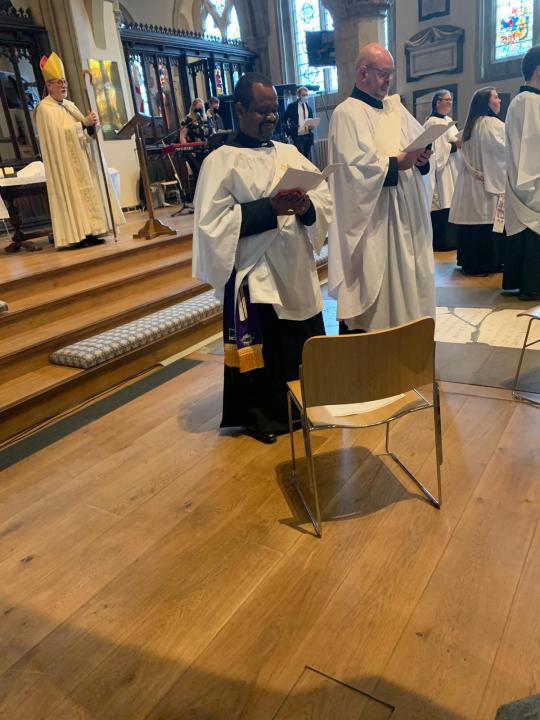
I chose the path of self-supporting minister, or worker priest as it is sometimes called. In this path, I continue to follow my career in the NHS, but I also minister in a church in my spare time, which as I have a young family is a challenge. But, one thing that I would say is my church has been very understanding. Some of my colleagues at Seminary choose to wear their clergy-wear at work. This is not something that I choose to do or can do in the context of my job, but in the Church of England there are many ways to be a minister. I keep my work life separate from my church life but some of my patients know about my ministry, as it is something that I am unashamed about. I just don’t minister in my work setting in the same way that I do in my church setting.
In my work setting, I minister by just being there for my patients, caring for them, listening to them in the same way that anyone else in healthcare would. It is a ministry of presence, one where God’s love is shown without you preaching or even mentioning the name of Jesus; a ministry that does not require ordination to do.
My church setting ministry is more varied, especially now that I can officiate weddings, baptisms, and funerals. It is a ministry in which you accompany people all throughout their lives. We are all a part of this ministry ordained, or not, as it is the ministry of all believers. The ministry of a priest is however distinct in a way that can be hard to explain in a simple way.
However, the best way to explain it is to use examples. For instance, the role of a minister/priest is to take ordinary things like bread and wine and to use them to show people the extent of the love of Jesus. He loved us so much that he gave himself completely to us, that he was willing to become like us, even in the extent of taking on all of our humanity, bearing the burden of our flaws and feeling the pain of aloneness, and death. His love for us means that we have a future with him beyond the pain of death, and that he will be with us always and his love is greater than we can imagine. The role of a priest is to take the ordinary splashing of water or putting of oil on the head of a child /adult and show people that this is a sign that God has made us his people. We are part of his family, loved and accepted, warts, flaws and all. The role of a priest is to hold all of God’s people in prayer, to stand in the gap for people who can’t/won’t/are unable to pray.
There are many other examples of what a Minister does, and in many cases these are more or less applicable to each individual Minister. That is the beauty of ministry in the Church of England. There are many roles, each needing a different type of person to fill them. You may not be the sort of minister who cycles around the village in a cassock, but if you feel that God has called you to minister there is a role that you can fill and minister in the church. Whether ordained or not, you can fulfil your calling to serve God in the way that he is calling you to serve him.
Revd Carol Bates, Assistant Curate at St Michael, East Wickham, reflects…
Several weeks before my Ordination, people kept telling me, “You must be getting excited about your ordination.”
Although many were excited for me, it took a while for me to feel the same way. Part of this, I think, was a safety mechanism I’d put in place in case the Ordination didn’t go ahead due to COVID government restrictions. Petertide (July) ordinations had been postponed till Michaelmas (September/October) and I envisaged a repeat postponement. Imposter syndrome was also popping up in my thoughts every now and again - Am I really going to be a Priest?..Seriously God, Me?..Is this all a dream?…
Thankfully my pre-ordination meeting with the Bishop and the on-line ordination retreat programme really helped to put my mind at rest and affirm that God is calling me to actually become more fully myself in the service of God and his people.
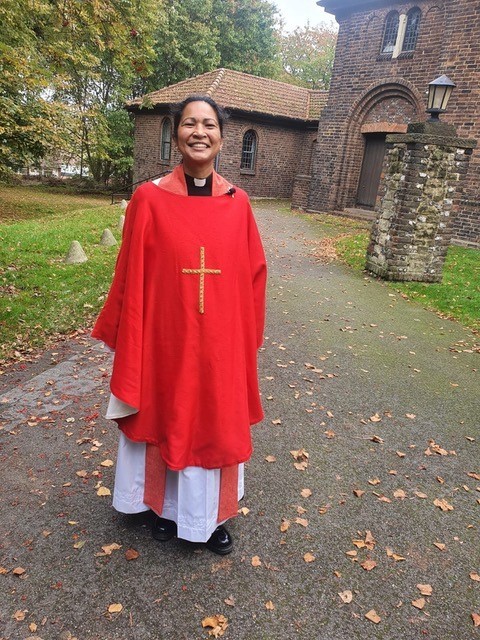
I don’t have to be the perfect imaginings of a Priest. I need to be myself. It is easy to develop a persona of being professionally religious. The challenge is to keep a grip on myself and be real and authentic, offering myself so that I can help connect people, on a profound level to God and to one another. So it’s ok to paint my nails bright orange and discuss Strictly come Dancing with my congregation every now and again.
Southwark ordinations were carried out in several churches in the different areas of Kingston, Croydon and Woolwich. It was a blessing to have had my ordination in the actual church in which I am serving- this made it extra special.
On the day of my ordination I walked to church in my cassock. I passed 10 walkers on the way greeting them with a smile and ‘Good Morning’. All of them reciprocated the cheery hello and one of them, Rupert, stopped to ask me where I was going. When I told him I was going to be ordained Priest at the church across the road he wished me all the best and congratulated me. It felt good to be encouraged by a complete stranger.
I arrived at church feeling very happy and peaceful. A number of people were setting up and getting ready -I am so grateful for all the work congregation members put in behind the scenes, so much effort goes into getting a church ready for an Ordination Service, particularly in the area of cleaning. I made sure they knew how much I valued them and their efforts.
It was good to greet family and friends as they arrived, many of whom I hadn’t seen for a long time, but amongst all the brewing excitement, conversations and bustle, I knew I needed to prepare myself. I lit some candles in memory of departed loved ones and focused my scattered thoughts and emotions on God.
The service was live-streamed and went really smoothly thanks to good organisation and the rehearsal beforehand.
When the Bishop laid hands on me, I felt myself physically trembling. There was also a rush of emotion and warm feeling in my head. Now when people ask me, ‘Do you feel any different? The answer is ‘Yes. Something happened when I got ordained. I was very much affirmed in my calling as Priest by family and friends, the congregation, my local priest, a diocesan Director, the diocesan Bishop and even a complete stranger! Most important of all, I felt God’s Holy Spirit rest upon me, affirming me as his precious child and that I am held in his love. The affirmation and love I received, particularly over my Ordination weekend, has given me fresh confidence in the work to which God has called me.

Looking back on the past 16 months as a Curate I am surprised at the amount of Civic duties in which I have been involved. Public speaking at the Greenwich and Bexley Hospice 25th Anniversary and Christmas Carol Services, Giving short talks about Christian Festivals and Hospitality at the Bexley InterFaith Forum, even the services and assemblies for our church school could be seen as a civic role. The role of a Parish Priest encompasses much more than the actual church and its congregation. Who was it that said, ‘The church exists solely for the benefit of those outside of it?’ Or words to that effect?
Serving the church in prayer and worship, even in a different tradition to what I am accustomed, has come naturally thanks to my ordinand training and the supportive training incumbents I’ve encountered along the way. Preaching has also been a natural joy thanks to my Reader training and experience along the way. Lockdown, due to the pandemic, made me deeply thankful for many other useful skills I gained previously as a Teacher of teenagers with Special Needs. The skill I’ve found most beneficial is that of making short videos and uploading them to Youtube. I was always making videos of my autistic students - the only way I could get them to do any work was if it was about them, work had to be relevant! Now I’ve been able to make videos about Good Friday, Pentecost, as well as record songs and sermons. Who would have thought I’d be using these skills again?…Nothing is ever wasted when it comes to serving God.
When I think about future goals, the impact of COVID on the Church’s way of being and purpose, influences much of my thinking. The Church must function outside of its building if it is to share the love of God with others, if it is to enable christians to grow in faith and in relationship to God and others. The building itself and its teaching must be relevant to its community context and finding ways to make church more relevant must be a goal for all of us. Making christian faith relevant for those who attend the church building, those gathering on-line and also for those who do neither, is something I’m working on. I’ve recently set up a public Facebook account, not to live-stream services ( although this does happen from time to time) but to share short messages, encouragements and prayers in order to make christian faith more relevant. It really is a good way to reach all kinds of people and many engage positively and ask questions.
I’ve also become acutely aware of the isolation experienced by those who don’t have access to social media and can’t get to church, much as they would love to. So finding ways for them to stay connected by socially distanced visits and hand delivering newsletters and sermons has become another goal to ensure in my present context. These seem like small steps but they have a massive impact on people’s lives and I would like to find ways of enabling others to connect and stay connected with the christian community.
Curacy is a time for learning, yet also listening to where the Spirit is leading for the future. I’ve been advised to seek opportunities to engage with new experiences and find out what gives me joy, what energises and interests me. These will help me to better discern where God might be leading in the future. One thing I know for sure is that nothing I’m learning, practicing or experiencing as a curate, at this COVID Pandemic time, will ever be wasted and it will all shape, strengthen and equip me into being the Priest God has made me to be 'for such a time as this.’
Revd Nicholas Quanrud, Assistant Curate at St John the Divine w St James the Apostle, Kennington, writes...
‘I am God’s wheat, and I shall be ground by the teeth of beasts, that I may become the pure bread of Christ.’
So said St Ignatius, the Bishop and Martyr on whose feast day I, along with fourteen others, was admitted to the sacred order of priests at the hands of Richard, Bishop of Kingston. Tradition has it that St Ignatius, having been consecrated Bishop of Antioch a mere fifty or so years after Jesus’ death, was eventually arrested and ordered to be taken to Rome, where he would be martyred. St Ignatius was accompanied on this long journey by a band of ten soldiers whom he described as ‘leopards.’ While the journey from St John the Divine, Kennington to All Saints, Kingston can feel like something of an odyssey in itself, it doesn’t take quite as long as it takes to travel from Antioch to Rome, even if you count the obligatory stop at a greasy spoon for a fortifying bacon sandwich. Nevertheless, to have St Ignatius’ words ringing in my ears as I prepared to be entrusted with the great and holy mystery of priesthood reminded me that while such an occasion was, of course, the cause for much celebration and thanksgiving, I was, like the great martyr, being led to a type of death: the death by which Christ transforms each one of us in baptism, the death we all undergo in order to be raised to new life in Him.

Death and suffering have no doubt felt closer to us in this most strange and sorrowful of years. And yet, God is in the midst of things, comforting and sustaining us by His Spirit, and forever offering us hope of new life in Christ. It’s difficult to reflect on my time as a Deacon and not divide it into two sections: before COVID-19 and after COVID-19. I could not have imagined at Petertide 2019 that within nine months churches would be closed for public worship for the first time in over eight-hundred years. I would never have thought that I would have to sing the Exsultet, the ancient proclamation sung by the Deacon at the Easter Vigil, into the lens of a camera in my front room, and not in the beauty and splendour of a church. And yet, God is still in the midst of things. One of the great privileges of my time as a Deacon has been visiting people in their homes: in my first week as Assistant Curate I had been handed a copy of the electoral roll by the Vicar, and off I went. I have experienced extraordinary hospitality, most commonly in the form of jollof rice and rum punch; and I have been inspired by the quiet and devoted faith of the members of our congregation. This is a faith which has not wavered in these times of pandemic, but from which many have drawn the strength to persevere, something which has strengthened and encouraged me. Not being able to visit people in their homes has been a huge loss to me, and we have had to adapt and find new ways of connecting with one another. The reopening of our churches in the summer was a great comfort to many, although, for us, not being able to celebrate occasions with the requisite food, drink and fellowship remains a source of great sadness.
In a famous sermon given at the first Mass of a new priest, Father Austin Farrer asked ‘What distinctive purpose does the priest hold in the mighty purposes of God?’, he continued, ‘The answer is before your eyes. Here is a new made priest, and what does he do? He hastens to the altar: he sets forth the mystery of love, the Body and Blood of Christ in bread and wine.’ Hasten to the altar I did, as I presided at the Holy Eucharist for the first time on the evening following my ordination. What a privilege, to make Christ present to His people in the blessed sacrament, as His priests have done for two thousand years, in times of joy and in times of sorrow, at the beginning of their Christian journey or at its end. What a joy, to fulfil a longing and desire to celebrate the Eucharist, to inhabit my vocation as a priest in its fullest expression at the altar.
And yet, my ordination and first mass do not represent the end of a journey, but rather the beginning. The pandemic has shone a light like a lightning bolt on the sin of racism in our nation and around the world, made most apparent in the killing of George Floyd and subsequent protests. The gap between rich and poor has widened, evident in levels of child hunger. There is much work to be done, both inside and outside of the church. As the Bishop instructed us at the ordination, we are to tell the story of God’s love, a story which our world so desperately needs to hear.

May we, like St Ignatius, be prepared to lose everything for the sake of the gospel.
1 note
·
View note
Text
The Journey to the Meal
By the Rev. Darren Miner
Gospel Reading
In the Name of the Father, and of the Son, and of the Holy Spirit. Amen.
Two years ago, I had the privilege of celebrating Eucharist with a group of Episcopal pilgrims at Emmaus, and I was asked to give an impromptu sermon. The temptation was to focus solely on the obvious eucharistic symbolism of the Gospel story. But I warned the congregation that if I did that, they would miss out on so much that can be learned from what preceded that illuminating meal.

For before the breaking of the bread that brought about the disciples’ epiphany, there was a journey, a seven-mile walk, in which, unbeknownst to the disciples, Jesus accompanies them on the way and proceeds to break open the scriptures. And there was a test. When they arrive at the disciples’ final destination, Jesus pretends to continue on his way; he is testing their hospitality, it would seem. The disciples pass the test with flying colors. Not only do they invite Jesus to dinner, but they ask him to bless and break the bread, an honor customarily reserved for the host. Having passed this little test, their eyes are finally opened, and they recognize Jesus.
Like those two disciples, we too are on a journey with Jesus. But there are some differences. We are not journeying to our home. We are journeying through a pandemic to an Emmaus that is uncharted and unknown. Like those two disciples, we too are being tested. But again there are some differences. For it is not our hospitality that is being tested, but our endurance and our very faith.
In normal times, we would be gathered together in church right now, and soon we would draw close to Jesus in the sacrament of Holy Communion, in the sharing of bread and wine made holy by our common prayer. But for a time, we cannot sup with the Risen Lord, and we are forced to journey on.
Even so, we are not bereft of Jesus’ presence. For just as Jesus accompanied his despairing disciples on their journey, so he accompanies us, even though we may not recognize his presence. And just as those disciples encountered the Risen Lord in the proclamation of Holy Scripture, so too do we encounter Jesus whenever the Good News is proclaimed, whether at a festal Easter Eucharist or at Morning Prayer by conference call.
And when at last our journey is over and we have arrived at our Emmaus, when we have passed the test of faith that has been given us, then we will once again offer the sacrifice of thanksgiving; then we will once again share in the sacred meal of bread and wine; then we will once again know the Risen Lord in the breaking of the bread. Alleluia! Alleluia! Alleluia!
© 2020 by Darren Miner. All rights reserved. Used by permission.
#Emmaus#journey#test#endurance#faith#Good News#Holy Communion#breaking of the bread#episcopal church#episcopal#episcopalian#The Episcopal Church#episcopalchurch#anglican#Anglican Communion#AnglicanChurch#theology#Christianity#Jesus#sermon
1 note
·
View note
Photo
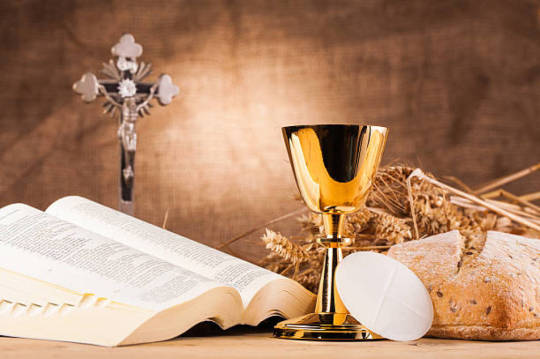
How We Can Give Thanks After Holy Communion
In Holy Communion, we are alone with God. Blissful solitude, where the soul can rise above the world, and with mute wonder, with breathless adoration, bask in the eloquently solemn silence of the Divine Presence!
In this solitude, where the voice of God is most articulate, we can support and sustain our conscious weakness with the strength of the personal revelation of the sacramental God. Our doubt and fear will vanish before Him who alone can satisfy the in-suppressible longings of the soul.
With inconceivable generosity, Christ can grant all we ask and more, for the incapacity of man cannot limit the bounty of God. In adapting Himself, however, to our limitations, He veils His eternal glory with the appearances of bread and wine, so as not to overpower us.
The period of thanksgiving should be for us, hushed in the bosom of the hidden Christ, one of rapt recollectedness, of wondering contemplation that marvels at the infinite perfections of Him whom we have received, of faith that renders these perfections visible, and of speechless amazement at the greatness of the gift. Our every faculty should be under the absolute control of the awe-inspiring Presence, the ears of our soul attentive to the voice of God, the eyes of our soul enamored of divine fascination, feasting upon our best Benefactor.
Nor will our contemplation be confined to the time of thanksgiving, as if we were beholding but a fleeting shadow of earth. The vision of the reality of the Divine Presence will perdure, with our whole being under the dominion of the indwelling God, who penetrates into the deepest depths of our souls and, with divine love, swallows up our poor, finite life in His infinite, eternal life. We will not look at Christ fitfully, but will be captivated by the beauty of the vision through habitually beholding it.
The darkness of our fallen nature will flee before the light within us, and, in the brilliant brightness of its divine radiance, not only will flaws of character, even the most trivial, be disclosed, but our entire being will be morally transformed by the Eucharistic God.
The light and power of the vision will, if the soul concentrates on it, produce this one marvelous effect of Holy Communion. In this sacrament, Christ plainly shows His goodness to the soul, so that it may rise under its compelling influence to a life of permanent union with Him, and be conformed to His image.
To gratify this dominant yearning of the Sacred Heart, the soul must divest itself of over-solicitude, divorce itself decisively and completely from attachment to the outward world, and direct its thoughts to Christ alone.
Largeness of desire should characterize our thanksgiving. In the gift of Himself, Christ includes all other gifts. Convinced of this truth, we can be bold with God. We can presume on His kindness and try to exhaust His generosity. We should banish all distrust of the Infinite Lover.
Nor must we have any misgiving, now that we possess Christ, about our ability to advance rapidly in virtue, for with God all things are possible, and to become a saint is the reason for our creation. Our expanding energies are not to be contracted by the thought, suggested by the Father of Lies, of old vicious habits; the copious flow of grace is not to be retarded by the sorrowful recollection of its former sins. The fear of sinning again, and therefore of severer judgment, must be supplanted by the yearning to advance in virtue because of greater grace received. Into this mystery of undying love, gloom born of sinful experience should not enter.
On the contrary, our soul should be joyously courageous and calmly confident, rising, as it embraces God in the fullness of fervent faith, up to the happiness of Heaven, even though we had before Holy Communion been desolate with fear and wasted with sorrow. Christ will surely answer such faith, because this largeness of desire imitates His own boundless beneficence.
A ready, spontaneous, practical correspondence with grace, the effect of lively faith, will accompany largeness of desire. Possessing God, the soul will grow in the consciousness of an increasing capacity for divine light, and will slowly acquire, within the scope of its limited powers, the knowledge of the full greatness of God’s love. Mental growth is measured by the prolonged contemplation of a particular study or a definite object. The increased mastery of a science depends upon the yearning for its acquisition.
The more the mind progresses in truth, the more enlarged and developed becomes its capability for receiving more truth.
As the horizon of knowledge widens, the mind’s power to grasp increases, and the desire for more knowledge keeps pace with the mind’s greater power of intelligence.
The same truth is seen in the spiritual order. The more we desire to know God, the clearer will be our vision of Him. As the vision enlarges, so do the capability and desire of the soul, and they will continue to grow through their mutually responsive action upon one another.
How truly unique is the Eucharistic revelation to us, despite the impenetrable veil that shrouds our sight! In the Blessed Sacrament, Christ dims the brilliance of the eternal glory of His manifestation by hiding His presence. And yet what an alluring paradise is the lingering radiance of this communication to the pure soul! God’s goodness in all its unblemished beauty is not concealed from the creature. This is all the soul needs to be convinced with peculiar force and cogency that one Holy Communion can make us a saint.
For this gift that rifles the treasures of omnipotent power, an acknowledgment of our utter unworthiness, actuated by sincere humility, is our best act of thanksgiving especially when we contemplate the vision of the infinite perfections of Christ that is mercifully vouchsafed to us. Like the sacramental God who, because He is eternal, cannot change, the revelation of His light in the soul is constant. Constancy, therefore, in the service of God will develop the soul for the greater diffusion of this light. The world’s enticing pleasures must not obscure the vision, or dim the light, by chilling the ardor of our desire ever to follow it by growing conformity to Him whom it manifests.
If we walk in the reflected glory of the sanctity of Christ within us, He, our Eucharistic Lover, will illumine us so that we may instinctively detect the treachery of the angels of darkness, and He will “direct our feet into the way of peace,” until He lifts the veil and we enter into that eternity of bliss that is incapable of exhausting the beauty of the vision.
BY: JOHN A. KANE
2 notes
·
View notes
Text

10th April >> (@ZenitEnglish By Deborah Castellano Lubov) #PopeFrancis #Pope Francis This Holy Thursday, #Pope Francis Praises Priests During Mass in Coena Domini in Nearly Empty St. Peter’s Basilica (Full Text). ‘I Thank God for the Priesthood’.
This Holy Thursday, Pope Francis has praised all the good and selfless priests worldwide.
Last year, the Pope visited the Velletri Correctional Facility, to celebrate the Mass in Coena Domini with the Rite of the washing of the feet, beginning the Paschal Triduum.
This year, as much of the world is in lockdown to prevent against further spreading of coronavirus, claiming thousands and thousands of deaths worldwide, and already more than 18,000 in Italy itself, the Pope’s schedule has changed.
He did not do the traditional Chrism Mass this morning, nor not make his annual outing for the Washing of the Feet.
Pope Francis instead celebrated in a nearly empty St. Peter’s Basilica the Mass in Coena Domini without that rite.
During his homily, he spoke about priests and praised the countless who are selfless, even to the point of giving their lives.
The Holy Father lamented the more than 60 priests have died in Italy from COVID19.
“Have courage,” the Pope encouraged priests, as the Lord is always with them. Francis praised those who travel to far off lands, even often giving their lives, and sometimes, to hardly ever be remembered by name.
He also remembered those who serve villages, who may not be well known to the world, but to their parishioners. The Holy Father applauded how they know the people they serve personally, and again — as he has in the past–reminded that priests should even try to know the names of the dogs of their parishioners.
The Holy Father lamented how some bad priests have made the lives of the others often subject to insult and disrespect, decrying the abuse crisis.
The Pope expressed his disappointment that the Chrism Mass could not take place in the Basilica this Holy Week, and how he wishes, if the situation were to get better, that it could perhaps be done before Pentecost (otherwise, next year).
Here is ZENIT’s working translation of Pope Francis’ off-the-cuff homily:
***
Holy Mass of the “Supper of the Lord” in Saint Peter’s Basilica
At 6:00 pm the afternoon, of March 10, 2020, Holy Thursday, at the Altar of the Chair, the Holy Father Francis presided over the Holy Mass “in the Supper of the Lord,” which marked the beginning of the Paschal Triduum.
The initial procession unfolded from the Altar of the Confession to that of the Chair, passing by the side of the “Altar of Saint Joseph.” In the course of the celebration, given the ongoing health crisis, the rite of the washing of the feet and the Offertory procession did not take place. Moreover, the repose of the Most Holy Sacrament was omitted.
Placed in the Vatican Basilica were the image of the Virgin Salus Populi Romani and the Crucifix of Saint Marcellus.
Here is a translation of the transcription of the text of the off-the-cuff homily that Pope Francis gave after the proclamation of the Holy Gospel.
* * *
The Holy Father’s Homily
The Eucharist, Service, Anointing.
The reality we are living today in this celebration: the Lord who desires to remain with us in the Eucharist. And we always become tabernacles of the Lord; we bear the Lord with us, to the point that He Himself says to us that, if we do not eat His Body and do not drink His Blood, we will not enter the Kingdom of Heaven. This is a mystery, of the bread and wine, of the Lord with us, in us, inside us.
Service. It is the gesture that is the condition to enter in the Kingdom of Heaven — to serve, yes, all. However, in that exchange of words that the Lord had with Peter (Cf. John 13:6-9), He makes him understand that to enter in the Kingdom of Heaven we must let the Lord serve us — that the Servant of God be our Servant. And this is difficult to understand. If I don’t let the Lord be my Servant, that the Lord wash me; make me grow, forgive me, I will not enter in the Kingdom of Heaven.
And the priesthood. Today I want to be close to priests, to all priests, from the last ordained to the Pope. We are all priests. The Bishops, all . . . We are anointed, anointed by the Lord; anointed to do the Eucharist, anointed to serve.
Today there is no Chrism Mass — I hope we will be able to have it before Pentecost, otherwise we will have to put it off until next year; however, I cannot let this Mass pass without remembering the priests, the priests that offer their life for the Lord, the priests that are servants. In these days, more than sixty have died here, in Italy, in giving attention to the sick in hospitals, and also with the doctors, the men and women nurses . . . They are “the saints next door,” priests that, serving, gave their life. And I think of those that are far away. Today I received a letter from a priest, a Franciscan, a prison chaplain, far away, who recounts how he is living this Holy Week with the detainees. There are priests that go far away to take the Gospel and die there. A Bishop said that the first thing he did, when he arrived in these mission posts, was to go to the cemetery, to the tombs of priests who departed from life there, young priests because of the local plague [local sicknesses]: they were not prepared, they did not have the antibodies. No one knows their name: they are anonymous priests. Country priests, who are the parish priest of four, five, seven hamlets, in the mountains, and they go from one to the other, and know the people . . . Once one of them told me that he knew the names of all the country people. “Really?” I said to him. And he said to me: “Even the name of the dogs!” They know everyone — priestly closeness. <They are> good, good priests.
Today I carry you in my heart and bring you to the altar. Slandered priests — it happens so often today. They cannot go on the street because awful things are said to them, in reference to the tragedy we have lived with the discovery of priests that have done awful things. Some have said to me that they cannot go out of the house as clergymen because they are insulted, <but> they continue… Priests sinners, who together with the Bishops and the Pope, sinner, do not forget to ask for forgiveness, and they learn to forgive, because they know they are in need of asking for forgiveness and of forgiving. We are all sinners. Priests that suffer crises, who do not know what to do, they are in darkness . . .
Today all of you, brother priests, are with me on the altar, you, the consecrated. I say to you only one thing: do not be headstrong like Peter. Let your feet be washed. The Lord is your Servant; He is close to you to give you the strength, to wash your feet.
And so, with this awareness of the need to be washed, be great forgivers! Forgive! Have a great generous heart in forgiving. It is the measure with which we will be measured. As you have forgiven, so you will be forgiven: the same measure. Do not be afraid to forgive. Sometimes doubts come . . . Look at Christ [he looks at the Crucifix]. The forgiveness of all is there. Be courageous, even in risking, in forgiving, in consoling. And if you cannot give a sacramental pardon in that moment, at least give the consolation of a brother that accompanies and leaves the door open so that that person returns.
I thank God for the grace of the priesthood; we all thank Him. I thank God for you priests. Jesus loves you very much! He only asks you to let your feet be washed.
[Original text: Italian] [ZENIT’s translation by Virginia M. Forrester]
9th APRIL 2020 19:32FRANCIS
1 note
·
View note
Photo
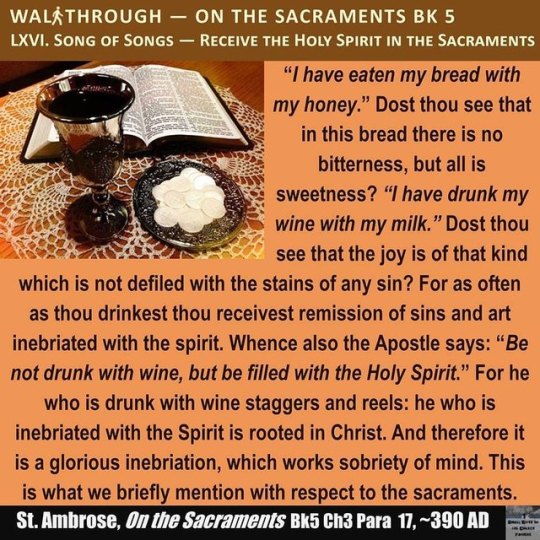
In the bread of the Eucharist we find no bitterness but are fed sweetness. In the wine we receive remission of sins and inebriation of the spirit with Joy that is not accompanied by any staggering or reeling. For this inebriation is rooted in Christ with clarity of the mind https://www.instagram.com/p/BxT-HSHF3LK/?utm_source=ig_tumblr_share&igshid=1m4zrmzt467cb
1 note
·
View note
Text
Catholic Services | emfunerals.com.au
A Catholic service is called Mass. It begins with the introductory rite when the priest processes into the sanctuary, usually accompanied by deacons and altar servers.
After a hymn is sung, the people stand to hear three or four Scripture readings. The homily explains the meaning of those readings.
Introductory Rites
The Introductory Rites of a Catholic Services Mass are the beginning of the liturgy and prepare us to celebrate the Eucharist. They include an entrance procession, a gathering song, a greeting and the penitential rite.
After the introductory rites, the priest offers a prayer from The Roman Missal. This prayer collects and unites our personal prayers as a congregation, with the universal prayers of the Church, including those for this season or feast day.
When the priest or deacon opens his book and cues you to stand, walk up to your pew (reverence the tabernacle on the way) and hold it as shown below. This helps the celebrant turn the pages. When the Collect is finished, return to your seat, making sure to reverence the tabernacle again as you do so. Then begin to reflect on the readings. This can be done during your quiet time at home or by listening to the podcasts offered by Denver Catholic.
Liturgy of the Word
A recent article in a national magazine featured a Catholic family that expressed concerns about the structure of worship and felt that it stifled genuine praise and sincerity. They also felt that the liturgy was overly complicated and obtrusive with repetitive responses, holy water and strange gestures.
Christians gather to hear God’s word and are transformed by it as they grow in faith more conformed to the mind of Christ. The Liturgy of the Word begins with a greeting by the priest or deacon: “The Lord be with you.” Then the first reading from the Hebrew Scriptures is read. It is generally chosen to harmonize with the Gospel reading and reveals continuity between Israel and Jesus who comes not to replace but fulfills Israel.
Then the second reading from the Epistles (letters of the New Testament) is read. A homily is then given. Homilies are either moral and hortatory or they are simply on a topic of the day or on a moral or doctrinal issue. The Nicene Creed or, especially during Eastertide and Lent, the Apostles’ Creed is then professed.
Liturgy of the Eucharist
The Eucharistic Liturgy consists of the Preparation and Offering of the Gifts, the Eucharistic Prayer and Communion. It is based on Christ’s actions at the Last Supper, when He took bread and wine, gave thanks, broke it and gave it to his disciples.
After the Introduction and Penitential Act we hear one or more readings from
Scripture, followed by a homily or sermon (or both), which draws on some aspect of the proclaimed readings. Then comes the recitation of the Apostles’ or Nicene Creed, if appropriate to the occasion.
After the recitation of the creeds and other brief prayers, we prepare to receive communion by having our hands blessed by the priest or deacon. This is an excellent opportunity to be mindful of our need for God’s forgiveness and renewal. Then we sing or say the Eucharistic Prayer. This is a moment of great mystery and great beauty!
Concluding Rites
As the Mass draws to a close, the priest gives a blessing Orthodox services. This is a solemn act of sanctification that calls upon God's aid for the faithful, so that they may go forth from the Mass renewed in their zeal for their mission and strengthened to resist evil and grow in their spiritual lives.
After the blessing, the priest reverences the altar (and if there is one present, the tabernacle) and bows profoundly to it. This is followed by the Dismissal.
Sometimes there is a brief set of pastoral announcements before the Dismissal. These indicate ways in which the assembly can live out during the coming week the commitment that was made at the Eucharist: for example, by assisting refugees, by gathering for evening prayer on Wednesday, by offering transport to elderly people and so on. Then, after the Dismissal, the Recessional Chant or Hymn begins. This accompanies the priest and servers as they process out of the church.
0 notes
Text
18th February >> My Daily Eucharist - Reflection for Roman Catholics.
Jesus invites us to come with him to the mountain, to the altar of Tabor. He invites us, like he did Peter, John, and James, to come aside to pray with him.
In the Liturgy of the Word, the plan of God for our salvation is reconfirmed. Just as Moses and Elijah gave meaning to what was about to happen according to God's plan, so the Word of the Lord in Mass each day gives meaning to all the happenings in our life.
On Mount Tabor, Jesus was transfigured and became resplendent. For a brief moment his divinity broke the shell of his humanity and the apostles witnessed his glory. In the Eucharist, Jesus remains hidden under the appearances of bread and wine. Occasionally he may gift us with an experiential awareness of his presence to bolster our faith, to reassure us of his loving presence.
The faith of Peter, John, and James was strengthened to such an extent that they could partially understand the tragedy of his passion and death which was to occur in the not-too-distant future, and that they might also be a pillar of support to the other apostles.
We have the privilege of meeting Jesus eucharistically each day at Mass. In the Mass we are nourished, strengthened, renewed, so that we can accompany Jesus wherever he may lead us that day.
Listen to the Father say to us at Mass: "This is my Son, my Chosen One. Listen to him."
With Peter, let your heart rejoice: "Master, how good it is for us to be here."
The Bread Of Life
David E. Rosage.
1 note
·
View note
Photo
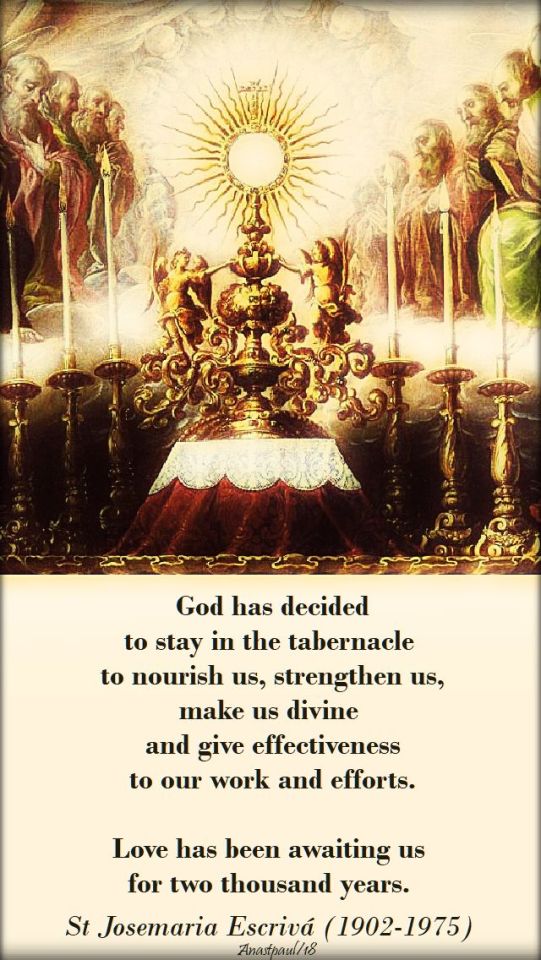
Thought for the Day – 3 June 2018 – The Solemnity of Corpus Christi
Excerpts from a homily given by Saint Josemaria Escrivá (1902-1975) on 28 May 1964, the feast of Corpus Christi and published in “Christ is Passing By.”
“Let’s turn our eyes to the holy Eucharist, toward Jesus. He is here with us. He has made us a part of Himself: “Now you are the body of Christ and individually members of it.” God has decided to stay in the tabernacle to nourish us, strengthen us, make us divine and give effectiveness to our work and efforts. Jesus is at one and the same time the sower, the seed and the final result of the sowing: the bread of eternal life.
The miracle of the holy Eucharist is being continually renewed and it has all Jesus’ personal traits. Perfect God and perfect man, Lord of heaven and earth, He offers Himself to us as nourishment in the most natural and ordinary way. Love has been awaiting us for two thousand years. That’s a long time and yet it’s not, for when you are in love time flies.
When we meet together around the altar to celebrate the holy Sacrifice of the Mass, when we contemplate the sacred host in the monstrance or adore it hidden in the tabernacle, our faith should be strengthened; we should reflect on this new life which we are receiving and be moved by God’s affection and tenderness.
In the Eucharist, Jesus gives us a sure pledge of His presence in our souls; of His power, which supports the whole world; of His promises of salvation, which will help the human family to dwell forever in the house in heaven, when time comes to an end. There we shall find God the Father, God the Son, God the Holy Spirit – the Blessed Trinity, the one and only God. Our whole faith is brought into play when we believe in Jesus, really present under the appearances of bread and wine.
On this feast of Corpus Christi in cities and towns throughout the world, Christians accompany our Lord in procession. Hidden in the host He moves through the streets and squares—just as during His earthly life—going to meet those who want to see Him, making Himself available to those who are not looking for Him. And so, once more, He comes among His own people. How are we to respond to this call of His?
The external signs of love should come from the heart and find expression in the testimony of a Christian life. If we have been renewed by receiving our Lord’s body, we should show it. Let us pray that our thoughts be sincere, full of peace, self-giving and service. Let us pray that we be true and clear in what we say—the right thing at the right time—so as to console and help and especially bring God’s light to others. Let us pray that our actions be consistent and effective and right, so that they give off “the good fragrance of Christ,” evoking is way of doing things.
The Corpus Christi procession makes Christ present in towns and cities throughout the world. But His presence cannot be limited to just one day, a noise you hear and then forget. It should remind us that we have to discover our Lord in our ordinary everyday activity. Side by side with this solemn procession, there is the simple, silent procession of the ordinary life of each Christian. He is a man among men, who by good fortune has received the faith and the divine commission to act so that he renews the message of our Lord on earth. We are not without defects; we make mistakes and commit sins. But God is with us and we must make ourselves ready to be used by Him, so that He can continue to walk among men.
Let us ask our Lord then to make us souls devoted to the Blessed Eucharist, so that our relationship with Him brings forth joy and serenity and a desire for justice. In this way we will make it easier for others to recognise Christ; we will put Christ at the centre of all human activities. And Jesus’ promise will be fulfilled: “I, when I am lifted up from the earth, will draw all men to myself.”
Comforted by Christ’s presence and nourished by His Body, we will be faithful during our life on earth and then we will be victors with Jesus and His Mother in heaven. “O death, where is your victory? O death, where is your sting?… Thanks be to God, who gives us the victory through our Lord Jesus Christ.”
(via Thought for the Day - 3 June 2018 - The Solemnity of Corpus Christi)
32 notes
·
View notes